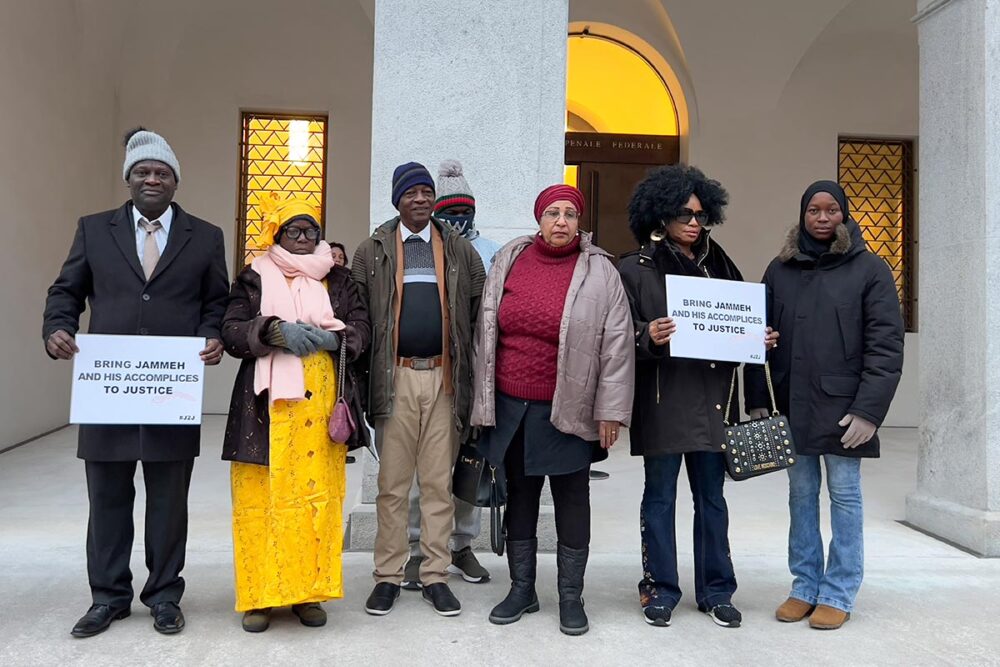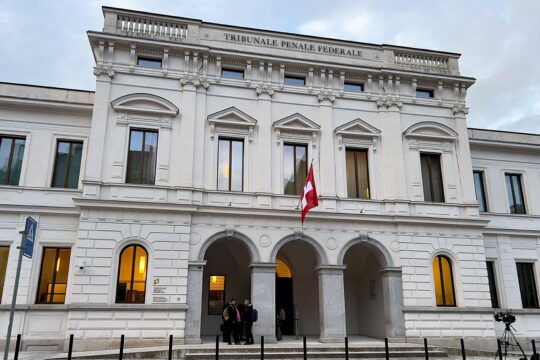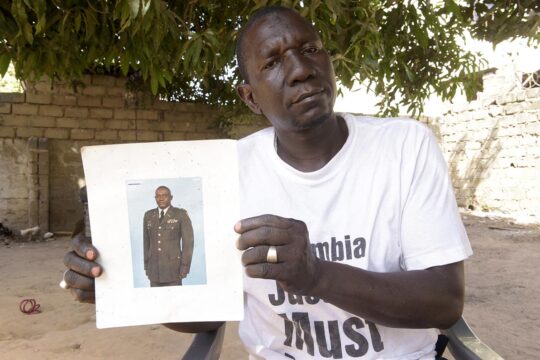After spending seven years on remand, former Minister of Interior of The Gambia Ousman Sonko is now defending himself against allegations made by 10 plaintiffs (one of whom, Nogoi Njie, passed away in September 2023). The trial began on January 8 in the Federal Court of Bellinzona, a small town in the Italian part of Switzerland. Sonko has contested the indictment – which includes murder, rape, illegal detentions, and torture allegedly committed between 2000 and 2016 – in its entirety. But his defence lawyer Philippe Currat’s request to throw out the case on procedural grounds fell flat. Witnesses are now on the stand.
Five of the plaintiffs – Binta Jamba, Ramzi Diab, Demba Dem, Madi Ceesay and Fatou Camara – have spent this whole week in the same room with their alleged perpetrator years after the crimes have been committed. “I feel very happy sharing the same room with a perpetrator, somebody who has trampled on my rights. Looking into his eyes or him turning seeing me. That made me really proud and happy because psychologically, that’s sending a positive message,” said Madi Ceesay, a member of parliament, who was a victim of torture at the time he was working as a journalist.
The case of Ousman Sonko is being heard under the principle of universal jurisdiction. Although the official language of The Gambia is English, the trial is in German, a language neither the plaintiffs nor the accused seem to understand. Disappointingly for the Gambian community, the proceedings would continue in the German language, despite the many efforts made requesting for translation into English. In the beginning of the proceedings, the court announced that important parts of the debates would be translated. But these important parts, it turns out, are announcements of the court’s schedule - mostly breaks.
It is an interesting atmosphere, where even the judges struggle to pronounce Gambian names correctly. Justice Info’s Gambian correspondent has to rely on interpretation from journalist colleagues to follow the parts of the proceedings that are only in German. And as days go by, the number of Swiss journalists covering the trial keeps going down.
2539 days in pre-trial detention
On the first two days, Sonko, dark in complexion and with distinctive lips, wore a blue suit. The 55-year old, who held one of the most senior positions in the small West African country, appeared to have lost weight compared to old photographs of him. His lawyer’s argument has always been that he cannot be tried in Switzerland for crimes against humanity, notably because most of the charges against him were crimes committed before January 1, 2011, which was the year the law on crimes against humanity was adopted in Swiss law. That should exclude, according to the defence, “all contents” relating to Binta Jamba, Ramzi Diab, Demba Dem, Madi Ceesay, Musa Saidykhan and Bunja Darboe, given crimes pertaining to them were committed before January 1, 2011. Currat further argued that his client could not be tried for torture because it has not been domesticated in Swiss law.
“Ousman Sonko has now been in custody for 2539 days and the question of whether the Swiss authorities have jurisdiction to prosecute him for the offences of which he is accused has still not been resolved,” the defence lawyer stressed during his submission. The court rejected all the preliminary pleas made by the defence, but it decided to provide clarity on the issue of jurisdiction only at the end of the trial.
“Swiss is not qualified to judge human rights”
“Let me emphasise that throughout my career, in all positions I have held, I have always remained loyal to my country, which I have always served to the utmost of my conscience. During all these years of investigation and until an indictment was brought before your Tribunal, the office of the Attorney General of Switzerland prevented the authorities of my country from exercising the consular protection that I had requested,” Sonko said, reading out his opening statement. “If I had had the opportunity to address the TRRC [the Truth, Reconciliation and Reparations Commission that ran public hearings in The Gambia from 2019 to 2021], I would gladly have done so, because it is essential that the Gambian people understand the situation that has prevailed in the country in the past. As always and everywhere, the situation is complex and has evolved throughout this period.”
The former minister lambasted the prison conditions he was subjected to in Switzerland, which he claimed resulted in an eye problem. With a disdainful look on his face, he said “some counsels took to the podium to criticise the Gambia and the government at the time. I will urge them to look at themselves in the mirror because I do not think Swiss is qualified or competent to judge anyone on human rights.”
He argued that the poor conditions of the prisons in Africa was a result of colonialism, claiming that as Interior Minister, he had worked on improving the prisons system in The Gambia and promoting human rights.
The accused’s daughter is in the room
On the far left of the defence team is the accused’s daughter, Olimatou Sonko, currently based in the United Kingdom, who graduated with a law degree about three years ago. “I cannot predict what would happen but we are hoping that at the end of the day he is found innocent and acquitted of all charges,” said the 23-year old lawyer. “Based on the indictment, all I see is like the Junglers [a notorious death squad under Yahya Jammeh’s rule in The Gambia, from 1994 to 2016] did this. I’m not seeing anyone, maybe apart from Binta Jamba, saying he [the accused] did this to me. So personally, I just think they are prosecuting the wrong guy. With the victims, obviously I feel sympathy for them and I’m glad that they have their voices heard and everything. I’m actually sorry that they had to go through all of that because no human being deserves to be treated the way they were treated. And I’m a woman, so in relation to Binta Jamba I sympathise with her but at the end of the day that’s my dad and just like any other defendant, I’m gonna believe that he is innocent until he’s proven guilty.”
On the third day, Binta Jamba faced the three judges as the first witness to take the stand. Jamba is the widow of Almamo Manneh, a State Guard soldier said to be one of the most loyal of Jammeh’s men at the time. Ousman Sonko has been accused of being complicit in the murder of Manneh by luring him into an ambush in 2000. Following the death of her husband, life took a turn for the worse for Jamba. At the victim’s lawyer’s request, the defendant was moved to another room where he could watch Jamba’s testimony. Sonko’s daughter, though, sat through the whole testimony as part of the defence legal team. But when the state prosecutor noticed her making eye contact with the witness, the matter was raised up with the judge and the court ordered that Olimatou Sonko’s seat be pushed behind so they cannot directly see each other.
Binta Jamba’s harrowing tale
Jamba told the court the financial difficulties she and her children were subjected to as a result of her husband’s murder. “After Almamo died, the house he was building, he [Sonko] went there and took everything. The cements and concrete. And he built his own house," she said. According to her, the accused searched their house after the murder and took the cash they had, some 125,000 Dalasi (the equivalent of 1,700 euros at today’s exchange rate).
Then she narrated how Sonko turned her into a “sex slave”. She said that Sonko repeatedly raped her in the year 2000, 2001 and 2005. The first time he raped her, she told the court, was in her mother’s house. “My kids were out, everybody were out. He locked the door. His first approach to me was ‘are you okay?’ because I was shaking. I said ‘leave me’, because in my religion or my culture when a husband passed away, you have to cover [your head], you’re supposed not to have anything to do for six months. He said ‘what do you mean?’ He pushed me inside the other room where the bed is. He pulled out his pistol, put it on the side of the bed. The headscarf I have on me, he told me take it off. I was crying,” Jamba recalled. “But upon all that, I thought that he was about to kill me. He didn't undress fully. He only took out his belt, pulled off his pants. He eventually told me ‘fuck you, what do you mean what are you supposed to do?’ I was on the bed pushing myself behind. I was crying. He took the gun. He said ‘if I heard a word, I will kill you’. He forced me to have sex,” an emotional Binta Jamba recounted.
The witness further testified that Sonko made her abort two pregnancies, an act that is illegal in The Gambia. "After the abortion, I was seriously sick because of the infection I got from it. I was constantly bleeding, and when I bleed, it smells," Jamba testified. “This man is an…” – the woman struggled to find her words – “…he is a very short-tempered person, very arrogant person in term of sex.”
From January 2001 to January 2002, Ousman Sonko was on a peace mission in Sierra Leone, a small country south of The Gambia where the civil war was being brought to an end by a UN military intervention. He denied the rape allegations, stating that he was not in The Gambia at the time the witness put the encounters. “In 2001,” Jamba told the court, “it was not frequent. I don’t know about his whereabouts those times. I cannot remember the months but like every three or three and a half months. And eventually during that time I didn’t see him for a whole six months.”
Sonko refused to comment on Almamo Manneh’s case, repeatedly responding to the judge’s question with “I am bound by an oath of secrecy.” He however denied the allegations against him.







